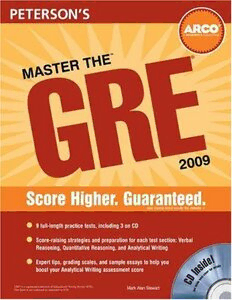
ARCO Master the GRE 2009 (with CD PDF
625 Pages·2008·4.023 MB·English
Most books are stored in the elastic cloud where traffic is expensive. For this reason, we have a limit on daily download.
Preview ARCO Master the GRE 2009 (with CD
Description:
peruse the other reviews. yes, it's unanimous. this is a one star study guide.
where i differ from, and what i would like to add to the other reviews is to provide more specific examples of where this guide is wanting:
1. there are some gems here. don't be fooled by all the mistakes. for example, there is a section on ALTERING FRACTIONS AND RATIOS that will be helpful if learned, Exponents You Should Know, a table delineating Exponents and the Real Number Line, a table of Roots You Should Know, a table of PYTHAGOREAN TRIPLETS, a nice geometry section, etc.
2. the section on PERMUTATIONS and COMBINATIONS, and PROBABILITY are wanting. insufficient and unacceptable for a study guide.
3. nice section on Circles and Inscribed Polygons, and Tangents and Inscribed Circles, although the explanations were wanting.
4. the reason why you want to avoid this book (or what section of the book to avoid) - the Analogies section:
but before I go there; the gem is ANALOGY CATEGORIES YOU SHOULD KNOW
now for it's flaws -
page 304 analogy incorporates the idea that mercury is unstable. look up mercury in the McGraw-Hill encyclopedia of science and technology. it isn't even remotely intimated that this element is unstable. if this analogy/reasoning were on an actual test, i'd be the first one to dispute it.
page 306 analogy asks us "is straightness a defining characteristic of an arrow? No ..." are you starting to get the picture? what of the idiom "straight as an arrow" ? what? are arrows suppose to be crooked? If this analogy/explanation were on an actual gre test, i'd be the first one to challenge it. i would think that even china has perfected the art of manufacturing straight arrows. which makes me wonder: who wrote that? who edited that? where is this coming from? who is going to think that an arrow is not, by definition, straight?
page 310 "does a clot reduce exposure to bleeding? No ..." whoever's heard of "exposure" to bleeding? a clot reduces bleeding. am i studying for the gre or a test in obfuscation?
page 312 - does a battlefield demonstrate a lack of strategy? sure it does. it is an expression of a lack of diplomacy. how a place where people are killing each other exemplify strategy? i would dispute this one.
page 316 is lying a form of insincerity? sure it is.
page 328 - verbal reasoning - what of this sentence: " ... nations are now tackling public-health problems jointly, through joint research programs." does this strike you as retarded? why not just say "... nations are now tackling public-health problems through joint research programs." ?
there's a reason for this study guide getting one star. it's because it's frustrating to read. it's stupid. i'm going to get over this book and move on to something more efficacious. and that's all i have to say about that.
See more
The list of books you might like
Most books are stored in the elastic cloud where traffic is expensive. For this reason, we have a limit on daily download.
